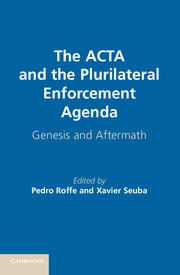Book contents
- Frontmatter
- Contents
- List of Contributors
- Foreword
- Acknowledgments
- Acronyms
- Introduction
- PART I THE FINAL ACT: ITS MAIN FEATURES AND CONTENTS
- PART II DOMESTIC LEGISLATIVE CHALLENGES
- PART III IMPACT ON RELATED PROCESSES
- 13 Three Steps Taken toward a Reinterpreted Three-Step Test
- 14 ACTA and the Future of Access to Knowledge in the Digital Environment
- 15 ACTA, East African Enforcement Legislation and Generic Medicines
- 16 The EU and Its IP Policies
- PART IV VIEWS FROM STAKEHOLDERS: LESSONS
- PART V WHAT LIES AHEAD ACTA
- Annex I Anti-Counterfeiting Trade Agreement
- References
- Index
- References
15 - ACTA, East African Enforcement Legislation and Generic Medicines
A Comparison
Published online by Cambridge University Press: 05 December 2014
- Frontmatter
- Contents
- List of Contributors
- Foreword
- Acknowledgments
- Acronyms
- Introduction
- PART I THE FINAL ACT: ITS MAIN FEATURES AND CONTENTS
- PART II DOMESTIC LEGISLATIVE CHALLENGES
- PART III IMPACT ON RELATED PROCESSES
- 13 Three Steps Taken toward a Reinterpreted Three-Step Test
- 14 ACTA and the Future of Access to Knowledge in the Digital Environment
- 15 ACTA, East African Enforcement Legislation and Generic Medicines
- 16 The EU and Its IP Policies
- PART IV VIEWS FROM STAKEHOLDERS: LESSONS
- PART V WHAT LIES AHEAD ACTA
- Annex I Anti-Counterfeiting Trade Agreement
- References
- Index
- References
Summary
Introduction
It is not the purpose of this chapter to provide yet another analysis of the possible implications of the Anti-Counterfeiting Trade Agreement (ACTA) for trade in generic medicines. This has been done in detail by various scholars. Instead, the present chapter seeks to shed some light on the legal frameworks regarding intellectual property rights (IPRs) enforcement in the East African Community (EAC) and some of its partner states, namely Kenya, Uganda and Tanzania, as compared to parallel provisions in ACTA. These countries are in the process of adopting, at the regional and/or the national level, specific anti-counterfeiting legislation that to some extent exceeds minimum standards established under the World Trade Organization’s (WTO) Agreement on Trade-Related Aspects of Intellectual Property Rights (TRIPS Agreement) as well as comparable provisions under ACTA. At the same time, these countries have been proactively pursuing policies of implementing public health-related TRIPS flexibilities in their domestic intellectual property (IP) legislation, which are at least partly affected by “TRIPS-Plus” obligations in the area of IPR enforcement. The present chapter illustrates the need for policy coherence between the areas of IP, trade and public health.
Anti-Counterfeit Legislation in the EAC – Latest Developments
In 2010, the EAC Secretariat made available to partner states an EAC Anti-Counterfeit Bill as drafted pursuant to a consultancy by two Nairobi-based law firms. The 2010 version received comments from partner states governments and underwent a number of minor modifications. Consultations between the EAC secretariat and partner states are currently pursued on the basis of the 2011 version of the bill. It is important to note that this piece of law, once adopted, is envisaged to take “precedence over all the laws of the Partner States with respect to any matter to which its provisions relate.”
- Type
- Chapter
- Information
- The ACTA and the Plurilateral Enforcement AgendaGenesis and Aftermath, pp. 244 - 258Publisher: Cambridge University PressPrint publication year: 2014

